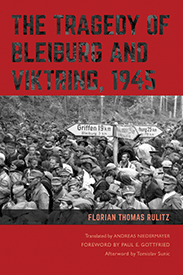The Tragedy of Bleiburg and Viktring, 1945
by The Editor

Florian Thomas Rulitz's new book examines Marshal Tito's communist genocide against Croatian elites at the end of World War Two.
The Tragedy of Bleiburg and Viktring, 1945
Florian Thomas Rulitz
Translated from the second German edition by Andreas Niedermayer
Foreword by Paul E. Gottfried
“Based upon impressive research, Rulitz’s study shows that thousands of anticommunist refugees were murdered by Tito’s Partisans—in many cases after having been repatriated by the British as the price for a Yugoslav Army withdrawal from Austrian territory. In his attempt to correct historical memory, Rulitz has written an important and original book.”—Lee Congdon, author of Seeing Red: Hungarian Intellectuals in Exile and the Challenge of Communism (NIU Press, 2001)
The atrocities and mass murders committed by Josip Broz Tito’s Partisan units of the Yugoslav Army immediately after the Second World War had no place in the conscience of Socialist Yugoslavia. More than once, the annual Croatian commemoration of the Bleiburg victims was subject to attacks carried out by the socialist Yugoslav state. Abroad in the West, on Austrian soil, the Yugoslav secret service (UDBA) did not shy away from murdering the protagonist of the Croatian memory culture, Nicola Martinovic, as late as 1975. The official history was aligned with a firm interpretational paradigm that called for a glorification of the anti-fascist “people’s liberation resistance.” With the breakup of Yugoslavia and its socialist regime in 1991, the identity-establishing accounts of contemporary witnesses, which had mainly been cherished in exile circles abroad, increasingly reached public awareness in Croatia and Slovenia.
In the 1990s Croatia witnessed the emergence of a memory that had been suppressed by the socialist-Yugoslav regime—namely the Bleiburg tragedy. The situation in Slovenia was similar in terms of identity and remembrance culture. Among the Slovenes, the communist crimes committed during the turmoil are known as the drama of Viktring or the Viktring tragedy, named after the largest refugee camp of the Slovenes. Reports on the communist postwar crimes and on the countless discoveries of mass gravesites have also begun circulating in the media of the German-speaking world in the last few years.
Florian Rulitz’s meticulously researched book, now published for the first time in English, provides a corrective to the historical memory that had been previously accepted as truth. Rulitz focuses on two essential questions. First, did the so-called “final encirclement battles” indeed occur in Carinthia in the Ferlach/Hollenburg/Viktring and Dravograd/Poljana/Bleiburg areas, resulting in military victories for the Yugoslav Army? Second, were the battles after the capitulation fought by the refugees with the aim of reaching the British-controlled areas in Carinthia? To answer these questions, Rulitz presents a detailed reconstruction of those days in May 1945. He furthermore considers the question of the murders on Austrian territory, which were hushed up in Partisan literature and presented as casualties of the final military operations. This groundbreaking study will interest scholars and students of modern European history.
July 2015 290 pp., 20 illus., 6x9
ISBN 978-087580-722-5
$39.00s Paper
Florian Thomas Rulitz is a historian of Alps-Adriatic military contemporary history.